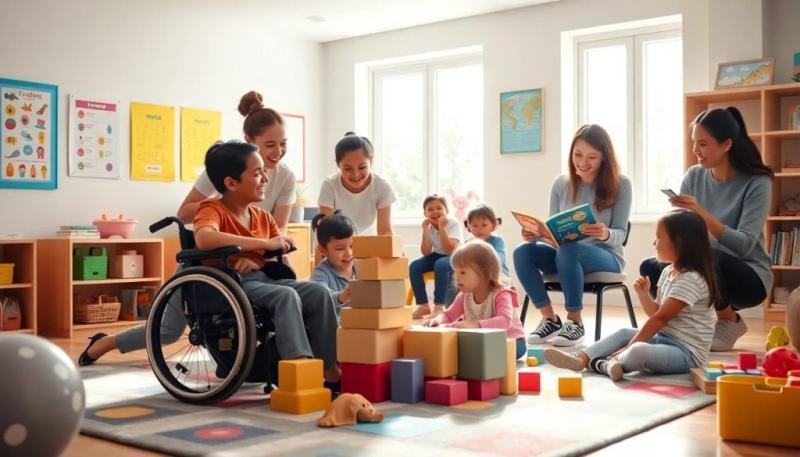Finding a qualified babysitter for children with special needs can be a daunting task for parents. It requires not only finding someone who is available but also someone who is genuinely capable of understanding and meeting the unique needs of these children. Experienced sitters trained to care for children with special requirements play a crucial role in ensuring that children receive the appropriate level of care and attention.
In this article, we will explore various aspects of finding the right babysitter for your special needs child. From understanding the importance of experienced sitters to practical tips on locating and preparing for a new caregiver, this guide will provide you with the necessary information to make an informed decision.
Finding a babysitter for children with special needs
Finding the right babysitter for your child with special needs requires a thoughtful approach. Parents should prioritize caregivers who have relevant experience and training. Many parents turn to specialized platforms like Sittercity, where they can find profiles of experienced sitters trained to care for children with special requirements.
When searching for a babysitter, consider reaching out to local organizations such as Autism Speaks and Easter Seals. These organizations often provide resources and can connect you with qualified caregivers who understand special needs. Additionally, personal recommendations from other parents can be invaluable in finding trustworthy sitters.
Another effective strategy is to conduct interviews with potential babysitters. During these discussions, ask about their experiences with children who have similar needs to your own. This not only helps gauge their suitability but also allows you to assess their comfort level and understanding of your child's requirements.
Why are experienced sitters important for special needs children?
Experienced sitters offer numerous benefits for children with special needs. First and foremost, their understanding of these children's unique challenges and behaviors allows for better communication and care. Such understanding fosters a safe and nurturing environment, which is essential for a child's development.
Moreover, trained sitters often have specific skills that can enhance the care provided. For example, many possess certifications in CPR and first aid, ensuring they can respond effectively to emergencies. This training is vital as children with special needs may have medical conditions that require immediate attention.
Additionally, experienced sitters are equipped to implement individualized care plans, tailored to each child's specific needs. This approach not only supports the child's well-being but also helps foster independence and confidence.
How to find a babysitter for a special needs child?
Finding a babysitter for a special needs child involves several steps to ensure the best match. Here are some effective strategies to consider:
- Research Local Agencies: Look for agencies that specialize in providing nannies for children with special needs. They often have pre-screened candidates with relevant experience.
- Online Platforms: Websites like Sittercity and Care.com allow you to filter searches specifically for sitters trained in special needs care.
- Community Groups: Join local parenting groups, both online and offline, where you can ask for recommendations and advice.
- Interviews and Trials: Conduct interviews with potential sitters and consider arranging trial sessions to observe how they interact with your child.
Each of these steps plays a crucial role in finding the right caregiver. It's essential to prioritize candidates who show genuine interest and understanding of special needs care.
What are the rates for special needs babysitters?
The rates for special needs babysitters can vary significantly based on several factors. Typically, rates are influenced by the babysitter's experience, location, and the level of care required. Understanding these variables can help parents budget appropriately.
In general, the special needs nanny salary tends to be higher than that of regular babysitters due to the specialized skills required. Depending on the region, hourly rates can range from $15 to $30 or more. For example, urban areas with a higher cost of living may see rates on the higher end of this spectrum.
It's also important to discuss any additional costs upfront. Some sitters might charge extra for specialized training or care for children with more complex needs. Parents should feel empowered to negotiate rates and clarify expectations to ensure a smooth working relationship.
What qualifications should a special needs babysitter have?
When considering a babysitter for special needs children, certain qualifications can significantly enhance the quality of care. Here are some essential qualifications to look for:
- Relevant Experience: Look for sitters who have direct experience caring for children with similar needs.
- Certifications: Certifications in CPR, first aid, or specific training related to special needs care are crucial.
- Educational Background: A background in special education or child psychology can be beneficial.
- References: Always check references to understand how previous families have rated their services.
These qualifications not only ensure that the sitter is capable but also provide peace of mind to parents. It's essential to prioritize caregivers who are dedicated to ongoing learning and development in the field of special needs education and care.
How to prepare your child for meeting a new babysitter?
Preparing your child for meeting a new babysitter can ease anxiety and create a more positive experience. Here are some strategies to consider:
1. Talk About the Babysitter: Explain who the babysitter is and what they will be doing while you are away. Use simple language and engage them in the conversation.
2. Meet in a Familiar Setting: Arrange for the babysitter to meet your child in a comfortable environment, such as your home or a favorite park. This familiarity can help reduce anxiety.
3. Involve Your Child: Encourage your child to express their feelings about the new babysitter. This open communication allows them to voice any concerns and feel more involved in the process.
4. Set Clear Expectations: Explain the basic rules and routines to the babysitter. This guideline allows for consistency in care and helps your child know what to expect.
By following these steps, parents can help make the transition to a new babysitter smoother for both the child and caregiver.
Where to look for experienced sitters for children with special requirements?
There are various avenues to explore when searching for experienced sitters for children with special requirements. Here are some recommended sources:
- Online Childcare Platforms: Websites like Sittercity and Care.com provide an extensive database of sitters, allowing you to filter for specific qualifications and experience.
- Local Agencies: Many agencies specialize in placing caregivers with experience in special needs childcare.
- Community Organizations: Organizations such as Autism Speaks and Easter Seals often have resources and referrals for parents seeking specialized care.
- Social Media Groups: Local community forums on Facebook or parenting websites can connect you with others who have recommendations.
These resources can significantly increase your chances of finding the right caregiver who understands your child's unique needs.
Related questions about finding care for children with special needs
How to babysit a kid with special needs?
Babysitting a child with special needs requires patience, understanding, and adaptability. Caregivers should familiarize themselves with the child's specific needs and preferences. It's vital to establish a routine that keeps the child comfortable and secure. For example, being aware of sensory sensitivities or communication styles can help create a supportive environment.
Additionally, active engagement through play and activities tailored to the child's interests is essential. This approach not only fosters a trusting relationship but also encourages skill development and social interaction.
What are the requirements to be a sitter?
To become a sitter, especially for children with special needs, several requirements must be met. First, a background check is often necessary to ensure the safety of the child. Furthermore, having certifications such as CPR and first aid is crucial.
Experience with children, particularly those with special needs, is also highly valued. This experience can be gained through previous babysitting roles, volunteering, or educational backgrounds focused on childcare or special education.
How to become a special needs babysitter?
Becoming a special needs babysitter involves a combination of education and experience. Many individuals start by obtaining relevant certifications, such as CPR and first aid, or specialized training in handling various special needs.
Networking within community organizations that focus on special needs can also lead to valuable opportunities. Volunteering or working in educational settings can further enhance your skills and understanding of the unique challenges these children face.
How to find a babysitter for a special needs child?
Finding a babysitter for a special needs child involves a comprehensive approach. Utilize online platforms, community organizations, and personal networks to gather potential candidates.
It's important to conduct thorough interviews, asking questions that pertain to their experiences and understanding of special needs. Additionally, checking references can provide insights into how effective the caregiver has been in similar situations.



